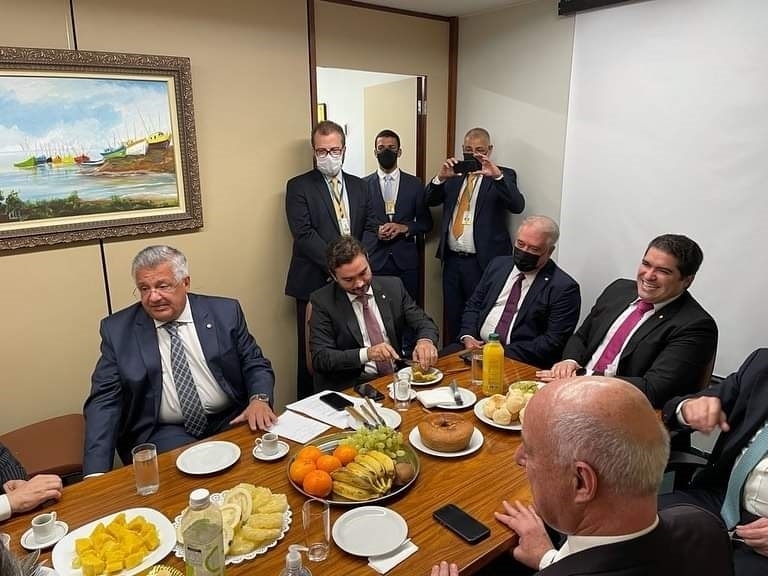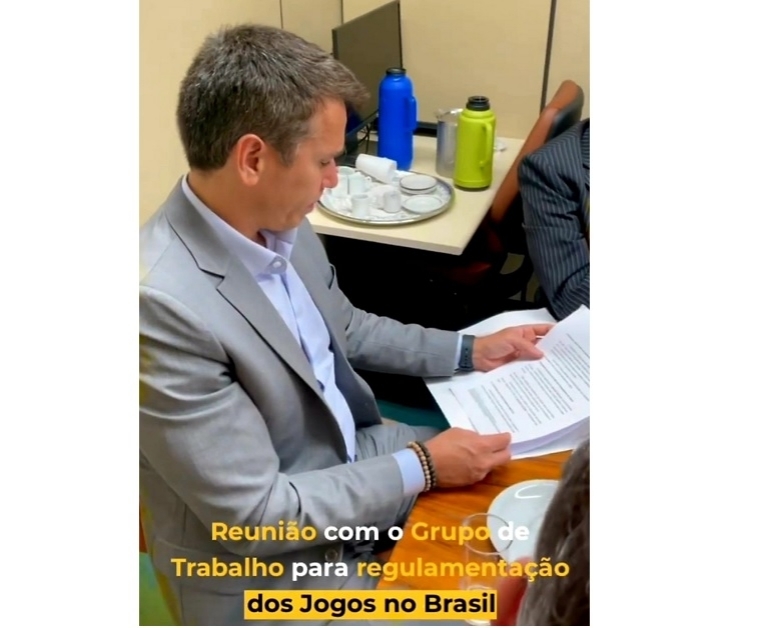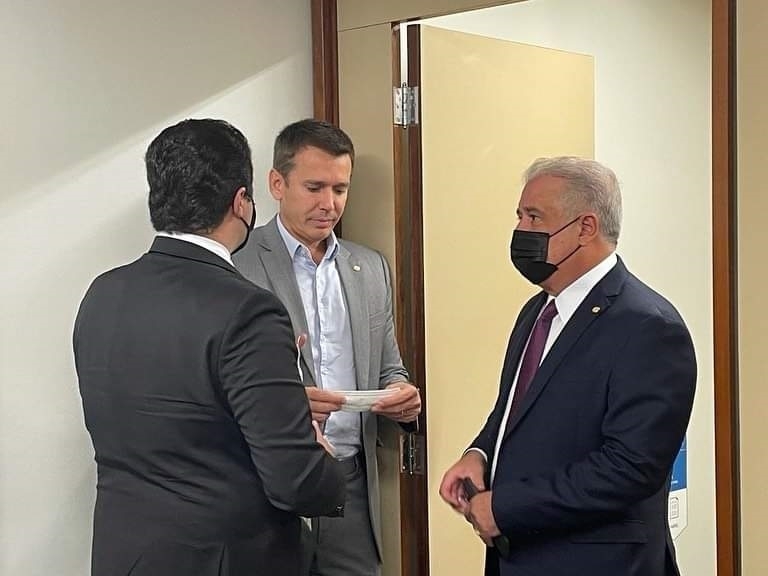

The rapporteur of the regulatory framework for gamng in Brazil, Federal Deputy Felipe Carreras (PSB-PE), delivered to the other members of the WG created to discuss the topic, his first document that deals with specific points that he intends to forward at the end of the work for deliberation.
In his initial argument, he claims to understand that in the original substitute approved by the Special Committee of Bill 442/91, “there are a series of small details that still need to be revised and analyzed, which will still take about 10-15 days to conclude. Even so, we have already defined the central guidelines that will guide this revision of the text.”

Among these points is the recognition that the division of competence between the Union, States and Municipalities “is unclear and not very logical... Considering that this is a matter of national repercussion, we will follow the line of concentrating the licensing of the gaming activities.” For that, Carreras intends to include “an authorization to the Executive Power for the creation of the National Gaming Agency.”
The deputy defends the creation of a CIDE (Contribution for Intervention in the Economic Domain) so that the tax collection of gaming is not destined to fund the government. “It is our intention to follow the direction of creating a CIDE, whose proceeds from the collection are used for specific purposes such as combating corruption, education, health, sports and tourism (in this case, allocating resources to Embratur).”
Still in relation to tax collection, he admits that he will analyze mechanisms to allocate part of the revenue via the State Participation Fund and the Municipality Participation Fund.

Carreras says in the document that he intends to "drastically" reduce the requirements regarding "to authorize the operation of casinos, such as the limitation of numbers by States and the requirement of a minimum quantity of ‘loor areas’, ‘casino floor’ and of integrated hotel rooms, among others, establishing differentiated parameters according to the population of the respective State in which they are installed.” On the other hand, he intends to maintain the requirement “considered by us as essential, such as the requirement that the operation of casinos only take place in integrated resorts.”
Recognizing that sports betting is already supported by law (13,758/18), it does not intend to keep the activity under the guise of the new legal document to be produced by the WG and later discussed and approved in Plenary. The only caveat is that "we intend to bring a provision to amend Law No. 13.756, of 2018, in order to establish the obligation that the exploitation of these online bets be done through servers located in Brazil, and are from legal entities that have their headquarters or representation in Brazil”.
The deputy also intends to delete from the text that replaces Bill 442/91 the provisions on rules for the exploitation of lotteries, considering that "this is a matter that already has special legislation, although sparse, we believe that it is not necessary to provide for lotteries in this Bill." The prevention of money laundering, according to Carreras, “will be dealt with in the sense of including specific provisions on this topic to incorporate good international practices.”
The replacement to Bill 442/91 provided for amnesty for all those accused of illegally exploiting gambling with the entry into force of the new law. For Felipe Carreras, this “contrary to the public interest, as it grants a general amnesty even to those who, under the aegis of the new law, have not been authorized to explore any of the gaming activities. Therefore, it is our intention to proceed in the direction of suppressing this provision.”

Although the deputy has set a deadline of 10-15 days to delve into the document, it is to be expected, both by the parliamentary agenda and by the complexity of the themes contained in the substitute, that his report will only be published at the end of November, as it was initially planned.
In this first version, for example, Felipe Carreras did not talk about machine rooms, urban casinos and jogo do bicho, among other important issues for the definition of a regulatory framework for complete games that contemplates all possible verticals.
The full text presented by Felipe Carreras follows:
BILL Nº 442, DE 1991
CENTRAL POINTS
Introduction: text still in preparation
The original Substitute approved by the Special Committee of Bill 442, of 1991, is being thoroughly reviewed by my Cabinet in conjunction with the Legislative Advisory of the Chamber. We understand that there are a number of small details that still need to be reviewed and analyzed, which will still take around 10-15 days to complete.
Even so, we have already defined the central guidelines that will guide this revision of the text, which we will present below.
The original Substitute provides for different instances of gaming licensing, granting different attributions to the Union (lotteries and casinos), States and Federal District (state lottery and animal game) and Municipalities (bingo houses).
This division of competence, which is unclear and illogical, does not follow the tradition of Brazilian law for issues with such scope and impact and can cause great confusion in the application of the law.
Considering that this is a matter of national repercussion, we will follow the line of concentrating the licensing of gaming activities in the Union.
We understand that, due to the relevance of the theme of gaming, the regulation and supervision of the activity cannot be subject to a devolved body, as it is today, in which the inspection of the sector is carried out by the Department of Evaluation, Planning, Energy and Control (Secap), of the Ministry of Economy.
In art. 76, the Substitute, in the search for a solution to this problem, establishes that "the Union shall, by specific law, provide for the creation of an agency responsible for regulating and supervising the activity of gambling in Brazil". However, such a provision may come to be considered an invasion of the Executive's competence.
For this reason, it is our intention to follow the direction of including a forecast that authorizes the Executive Power for the creation of the National Gaming Agency. We will not create it directly so as not to provoke a vice of initiative in the matter. We are still evaluating the legality of this alternative.
We understand that the tax revenue that will come with the regularization of gaming cannot and should not be restricted to making money for the government.
Therefore, it is our intention to move towards the creation of a CIDE, whose proceeds from the collection are used for specific purposes such as combating corruption, education, health, sports and tourism (in this case, allocating resources to Embratur).
We are thinking of taking CIDE Combustíveis, provided for in Law 10,336, of 2001, as one of the main references for this differentiated distribution of resources.
We also understand that the tax collection proceeds that will come with the regularization of gaming cannot and should not be restricted to making money for the Union. It is necessary to distribute part of this collection with the States and Municipalities.
Therefore, it is our intention to continue in the direction of distributing part of the proceeds from the values of others via FPE and FPM.
The Substitute lists a series of requirements to authorize the operation of casinos, such as the limitation of numbers by States (art. 27) and the requirement of a minimum quantity of "floor areas", "casino floors" and hotel rooms integrated, among others, establishing differentiated parameters according to the population of the respective State in which they are installed (art. 28).
We understand that such requirements are unreasonable and their provision by law may unnecessarily stifle the project.
Therefore, we are thinking of drastically reducing these legal requirements, keeping only some that we consider essential, such as the requirement that the operation of casinos only take place in integrated resorts.
As with casinos, the Substitute presents a series of requirements to authorize the operation of bingos, such as a minimum area (art. 38, §2º), minimum capacity when dealing with stadiums for sports entities (art. 39) and number minimum number of machines (art. 41).
For the same reasons presented above, we therefore think of drastically reducing these legal requirements, such as the requirement that the exploitation of casinos only occur under the concept of bingo hall, that is, establishments that develop cultural activities, shows, or even sports activities, together with the exploration of bingo.
The Substitute also conveys several legal rules about online gambling and betting. It so happens that the subject has already been properly regulated in Law No. 13.756, of 2018 (arts. 29 to 35), pending regulation by the Executive Branch.
Considering that this is a matter that already has special legislation, although sparse, we believe that, in addition to being unnecessary, it would not be good legislative technique to include the subject of lotteries in this Bill.
However, we intend to bring a provision to amend Law No. 13.756, of 2018, in order to establish the obligation for the exploitation of these online bets to be carried out through servers located in Brazil, and are from legal entities with headquarters or representation in Brazil.
The Substitute also publishes some rules on practices aimed at preventing compulsive gambling and protecting people who are vulnerable to gambling – what has come to be called “responsible gambling”.
We intend to maintain and even deepen the provisions related to this point a little.
Despite mentioning the prevention of money laundering in some parts of the text, including raising it to the condition of principle to be observed in the exploration of games of chance, the Substitute does not go into greater detail about the PLD mechanisms and practices applicable to the industry of games.
Therefore, it is our intention to follow the direction of including specific provisions on this topic, in order to incorporate good international practices.
Another controversial point of the Substitute is that which provides that “all those accused of illegally exploiting gambling under the legislation prior to the entry into force of this Law are subject to amnesty” (art. 78). In the same provision, the Substitute provides that all legal proceedings in progress that have as their object the practice of contravention of gaming will be “automatically extinguished” from the date of publication of the law.
We understand that the broad and general amnesty, in addition to attracting unnecessary political obstacles, goes against the public interest, as it grants a general amnesty even to those who, under the aegis of the new law, have not been authorized to explore any of the activities of gaming.
Therefore, it is our intention to move in the direction of suppressing such a provision.
The Substitute establishes prohibitions that seem to us unjustifiable for agents operating gambling, such as receiving loans and financing from official financial institutions (art. 10, I), having access to tax benefits (art. 10, III) and that of carrying out a financial transaction with a “financial system entity.”
However, if the purpose of the Bill is to legalize the practice of gaming, its exploitation would become lawful and, to that extent, the more restrictive treatment would constitute discrimination against such agents and could come to be considered unconstitutional, for violating, among others, the principle of free enterprise (articles 1, IV and 170, caput, of the Constitution) or even the principle of isonomy.
For these reasons, it is our intention to move towards the removal of such restrictions.
The Substitute conveys legal rules about lotteries. Considering that this is a matter that already has special legislation, albeit sparse, we understand that it is not necessary to provide for lotteries in this Bill.
Therefore, it is our intention to proceed in the direction of suppressing these provisions.
Fixed odds sports betting were authorized by law, but still lack regulation by the Executive Branch. This scenario has caused several international operators to be hiring advertising spaces for an activity that is illegal in Brazil.
There is no sense in the possibility of disclosing products and services that are illegal in the national territory.
Source: GMB